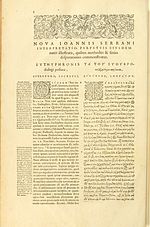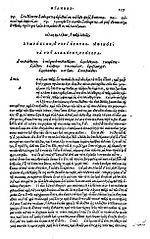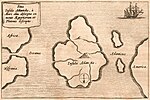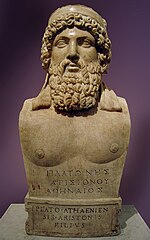Euthyphro (/ˈjuːθɪfroʊ/; Ancient Greek: Εὐθύφρων, romanized: Euthyphrōn; c. 399–395 BC), by Plato, is a Socratic dialogue whose events occur in the weeks...
25 KB (3,491 words) - 14:30, 29 October 2024
and is one of four Socratic dialogues, along with Euthyphro, Phaedo, and Crito, through which Plato details the final days of the philosopher Socrates...
34 KB (4,508 words) - 08:46, 25 October 2024
by the philosopher Plato. Euthyphro's biography can be reconstructed only through the details revealed by Plato in the Euthyphro and Cratylus, as no...
5 KB (615 words) - 15:29, 29 October 2024
The Euthyphro dilemma is found in Plato's dialogue Euthyphro, in which Socrates asks Euthyphro, "Is the pious (τὸ ὅσιον) loved by the gods because it is...
69 KB (9,593 words) - 09:18, 2 November 2024
authored by Plato around 375 BC, concerning justice (δικαιοσύνη), the order and character of the just city-state, and the just man. It is Plato's best-known...
65 KB (8,599 words) - 21:20, 4 November 2024
Plato (/ˈpleɪtoʊ/ PLAY-toe; Greek: Πλάτων, Plátōn), born Aristocles (Ἀριστοκλῆς; c. 427 – 348 BC), was an ancient Greek philosopher of the Classical period...
95 KB (9,692 words) - 19:05, 13 November 2024
romanized: Sympósion, lit. 'Drinking Party') is a Socratic dialogue by Plato, dated c. 385 – 370 BC. It depicts a friendly contest of extemporaneous...
40 KB (5,468 words) - 15:37, 29 October 2024
Crito (redirect from Plato's Crito)
ISBN 9780198140153 Plato (2018-06-23). Crito. Wildside Press LLC. pp. 43c–45c. ISBN 9781479418299. OCLC 1043756381. "Crito", Plato: Euthyphro; Apology of Socrates;...
44 KB (5,822 words) - 22:13, 6 November 2024
Socratic literature, particularly Plato's dialogues, where he is named as the chief accuser of Socrates. In the Euthyphro, Plato describes Meletus as the youngest...
3 KB (300 words) - 20:57, 28 October 2024
Allegory of the cave (redirect from The Cave (Plato))
Plato's allegory of the cave is an allegory presented by the Greek philosopher Plato in his work Republic (514a–520a, Book VII) to compare "the effect...
25 KB (2,981 words) - 01:21, 4 November 2024
Platonic Academy (redirect from Plato's Academy)
variously known as Plato's Academy, the Platonic Academy, and the Academic School,[citation needed] was founded at Athens by Plato circa 387 BC. Aristotle...
27 KB (3,447 words) - 10:03, 29 October 2024
Theory of forms (redirect from Form (Plato))
realism is a theory widely credited to the Classical Greek philosopher Plato. The theory suggests that the physical world is not as real or true as "Forms"...
38 KB (5,121 words) - 12:52, 4 November 2024
Phaedrus (dialogue) (redirect from Phaedrus (Plato))
StandardEbooks Greek text at Perseus Plato & Nichols, J. H. (tr. and ed.). Phaedrus. Cornell University Press. (1998). Plato: Euthyphro, Apology, Crito, Phaedo, Phaedrus...
44 KB (6,319 words) - 11:07, 11 October 2024
In Plato's Republic, the character of Socrates is highly critical of democracy and instead proposes, as an ideal political state, a hierarchal system...
4 KB (519 words) - 21:05, 24 June 2024
Timaeus (dialogue) (redirect from Plato's Timaeus)
Tfd›Greek: Τίμαιος, translit. Timaios, pronounced [tǐːmai̯os]) is one of Plato's dialogues, mostly in the form of long monologues given by Critias and Timaeus...
26 KB (3,440 words) - 09:43, 10 October 2024
Meno (redirect from Meno (Plato))
(/ˈmiːnoʊ/; ‹See Tfd›Greek: Μένων, Ménōn) is a Socratic dialogue written by Plato. Meno begins the dialogue by asking Socrates whether virtue is taught, acquired...
18 KB (2,468 words) - 02:12, 3 November 2024
Atlantis (section Plato's dialogues)
romanized: Atlantìs nêsos, lit. 'island of Atlas') is a fictional island mentioned in Plato's works Timaeus and Critias as part of an allegory on the hubris of nations...
97 KB (11,760 words) - 05:14, 13 November 2024
Plato's theory of the soul, which was inspired variously by the teachings of Socrates, considered the psyche (Ancient Greek: ψῡχή, romanized: psūkhḗ)...
15 KB (1,819 words) - 09:43, 12 November 2024
Plato's so-called unwritten doctrines are metaphysical theories ascribed to him by his students and other ancient philosophers but not clearly formulated...
75 KB (10,575 words) - 02:37, 29 August 2023
Phaedo (redirect from Phaedo (Plato))
the death of Socrates, and is Plato's fourth and last dialogue to detail the philosopher's final days, following Euthyphro, Apology, and Crito. One of the...
31 KB (4,590 words) - 16:03, 1 November 2024
Myth of Er (redirect from Er (Plato))
‹See Tfd›Greek: Ἤρ, translit. ér, gen.: Ἠρός) is a legend that concludes Plato's Republic (10.614–10.621). The story includes an account of the cosmos and...
13 KB (1,772 words) - 13:54, 3 May 2024
encompasses all instances of a deity dictating a society's morals. Plato's "Euthyphro dilemma" is a dialogue written to point out the inconsistencies of...
22 KB (2,282 words) - 03:52, 25 October 2024
Research Lab, Stanford University, retrieved 2023-11-16 Plato. "Euthyphro." The Collected Dialogues of Plato, edited by Edith Hamilton and Huntington Cairns,...
138 KB (22,295 words) - 08:06, 14 November 2024
Some 250 known manuscripts of Plato survive. The following is a partial list of manuscripts of Plato's dialogues. There are 51 Byzantine manuscripts in...
18 KB (322 words) - 11:51, 18 September 2024
Socratic dialogue (redirect from Plato dialogues)
the fourth century BC. The earliest ones are preserved in the works of Plato and Xenophon and all involve Socrates as the protagonist. These dialogues...
14 KB (1,623 words) - 18:41, 28 October 2024
Many interpreters of Plato held that his writings contain passages with double meanings, called allegories, symbols, or myths, that give the dialogues...
55 KB (7,421 words) - 03:54, 20 February 2023
Demiurge (section Plato and the Timaeus)
eventually "creator". The philosophical usage and the proper noun derive from Plato's Timaeus, written c. 360 BC, where the demiurge is presented as the creator...
43 KB (5,803 words) - 09:16, 13 November 2024
Anamnesis (philosophy) (redirect from Anamnesis (Plato))
In Plato's theory of epistemology, anamnesis (/ˌænæmˈniːsɪs/; Ancient Greek: ἀνάμνησις) refers to the recollection of innate knowledge acquired before...
8 KB (1,071 words) - 06:35, 29 October 2024
Ion (dialogue) (redirect from Ion (Plato))
In Plato's Ion (/ˈaɪɒn/; ‹See Tfd›Greek: Ἴων) Socrates discusses with the titular character, a professional rhapsode who also lectures on Homer, the question...
9 KB (1,266 words) - 04:37, 6 October 2024
Laws (dialogue) (redirect from Laws (Plato))
The Laws (Greek: Νόμοι, Nómoi; Latin: De Legibus) is Plato's last and longest dialogue. The conversation depicted in the work's twelve books begins with...
22 KB (2,728 words) - 18:21, 2 November 2024













